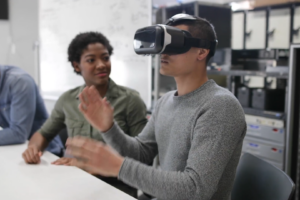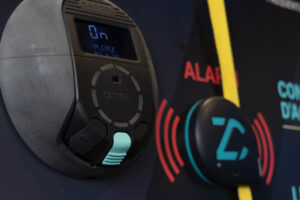
ARIADNA, a European project to promote the use of GALILEO applied to urban mobility
February 1, 2020
COVID-19 · The UPC collaborates with the catalan Ministry of Health on requirements to make reusable healthcare masks
March 1, 2020The Wireless Networks Group (WNG) at the UPC participates in CARAMEL, a European project whose main objective is to respond to current cybersecurity challenges of connected vehicles, through advanced technologies of Artificial Intelligence and Machine Learning.
To achieve this, various types of vehicles will be considered (cooperative, connected, autonomous and electric), and new methods and solutions will be sought to reduce the cybersecurity risks associated with each of them.
Although protocols currently exist to guarantee security, vehicle connectivity, autonomous driving systems and smart charging of electric vehicles introduce new cybersecurity breaches that should be tackled.

As part of CARAMEL, intrusion detection system (IDS)/intrusion prevention system (IPS) products will be developed as well as advanced technologies and services to manage complex cyberattacks and reduce potential damage. In addition, new interoperable, scalable ICT infrastructure will be designed to provide sustainable cybernetic security and digital privacy.
Cybersecurity is one of the four most serious global risks that we are facing, according to the World Economic Forum in Davos at the start of 2018. In 2020, experts predict that 20 billion devices will be connected, which will doubtless lead to a higher number of cybernetic attacks.
The pilot tests of CARAMEL will be carried out in Karlsruhe, and they are scheduled in January 2022.
The CARAMEL project has received funding of 5 million euros from the Horizon 2020 programme of the European Union and will be executed over 30 months (October 2019 to March 2022). The project is coordinated by i2CAT and has 14 other participating members from 8 European countries (Germany, Spain, Cyprus, Portugal, the Netherlands, the United Kingdom, Greece and Austria).
The CARAMEL project has received funding of 5 million euros from the Horizon 2020 programme of the European Union and will be executed over 30 months (October 2019 to March 2022). The project is coordinated by i2CAT and has 14 other participating members from 8 European countries (Germany, Spain, Cyprus, Portugal, the Netherlands, the United Kingdom, Greece and Austria).
You want to know more?
Related Projects
- The Visualisation, Virtual Reality and Graphic Interaction Research Group (ViRVIG) at the Universitat Politècnica de Catalunya - BarcelonaTech (UPC) has participated in the XR4ED project, an initiative that connects the educational technology (EdTech) and Extended Reality (XR) sectors, with the aim of transforming learning and training across Europe.
- The inLab FIB at the UPC has collaborated with Lizcore® for the development of a proof of concept based on artificial intelligence to improve safety in climbing with autobelay devices. The system allows the automatic and accurate detection of risk situations before starting a route.
- Researchers from the Centre for Image and Multimedia Technology of the UPC (CITM) and from the DiCode research group (Digital Culture and Creative Technologies Research Group) of the Universitat Politècnica de Catalunya – BarcelonaTech (UPC) have worked on the project The Eyes of History, an initiative of the Catalan Agency for Cultural Heritage that offers an immersive view of Catalan cultural heritage. It is especially aimed at the first and second cycles of secondary education and was created to bring heritage into the classroom. Its goal is to bring the history and monuments of Catalonia closer in a vivid and innovative way, using tools such as virtual reality and new museographic narratives.
- City and Play is a social action project coordinated by researchers from the Centre for Image and Multimedia Technology (CITM) and the DiCode research group (Digital Culture and Creative Technologies Research Group) of the Universitat Politècnica de Catalunya – BarcelonaTech (UPC), the Universitat Oberta de Catalunya (UOC) and the University of Barcelona (UB), and funded by Barcelona City Council. The aim of the project is to promote civic competences and reflection on the urban environment among adolescents through the creation of an open framework that uses methodologies based on play, co-creation and storytelling.




